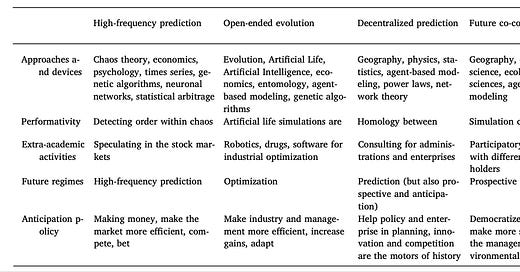Hello and welcome to Growing Meta.
I will be sharing the most insightful bites of scholarly conclusions and discoveries that augment our understanding of knowledge & complexities. This newsletter will slowly converge into a mountain range of meta — what are the best lenses that view all other lenses?
Recent idea(s):
The direction of interdisciplinary fields is greatly defined by the composition of its researchers’ knowledge profiles.
Can we group them by epistemic, ontological, axiological and anticipatory positions?
Social scientists Céline Granjou and Isabelle Arpin introduce two concepts (2015, 2016):
Epistemic Commitments: An approach of studying the diversity of knowledge creation mechanisms in interdisciplinary fields, such as environmental science and futures studies. It essentially examines and highlights how researchers apply their previous knowledge from their domains, and continuously change or stick to their epistemic commitments based on the context of their works.
Anticipation Communities: An extension on the study of epistemic commitments that examines a communities’ notion of the future. Granjou describes it as:
"A regime of anticipation is defined as a group of researchers, experts and managers sharing a specific scenario and representation of the future of [the interdisciplinary field], to a certain kind of project of understanding the evolution of [the field] …. to a certain model of science/politics interface. Communities of anticipation thus also share a certain politic of anticipation. ... Communities of anticipation therefore not only share a vision of the future of [the field] and a prescriptive ideology, but also a kind of practical investment into a project of knowledge and governance to face the future with."
In Five anticipation communities in complex systems sciences: Complexity science and its visions of the future (2020), the author adopts these concepts on the study of future by complexity scientists, to define their ‘future regimes’:

These concepts also shed light on the importance of considering constructivism in interdisciplinary fields, a theory in education that recognizes that a person builds on previous knowledge and experience.
Veteran idea(s):
“Science must, over the next 50 years, learn how to deal with problems of organized complexity”
In his 1948 work, Science and complexity, prominent mathematician Warren Weaver so beautifully outlines three problems of interest when doing science:
Problems of Simplicity: Using only few variables — Limits the scope of understanding science.
Problems of Disorganized Complexity: Using billions or trillions of variables — It assumes linearity and lack of meaningful interaction between variables, which does not explain emergent properties.
Problems of Organized Complexity: Using a “sizable number of factors which are interrelated into an organic whole” — This outlines one basic definition of complexity science. Warren believes science problems should be approached using this framework.
Say you want to study temperature and pressure: in 1 you would only study these two variables, in 2 you would attempt to understand temperature and pressure as properties emerging from trillions of disorganized air molecules, and in 3, you would outline and study the factors governing the system of thermodynamics and their interactions with each other.
It’s a simple taxonomy yet still a relevant one.


